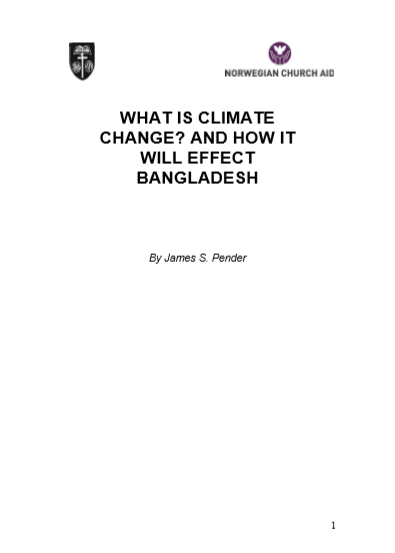WHAT IS CLIMATE CHANGE? AND HOW IT WILL EFFECT BANGLADESH

The world‟s climate has always been changing between hotter and cooler periods due to various factors. However, for the first time in the earth‟s history it has now been firmly established that its human inhabitants are altering the climate through global warming as a result of greenhouse gas emissions. Although the basic science is now clear, the full range of effects due to human influenced climate change is still not fully understood.
However, it is known that climate change in the next hundred years will be significant and by the year 2100 best estimates predict between a 1.8˚ C and 4 ˚C rise in average global temperature, although it could possibly be as high as 6.4˚ C. Food production will be particularly sensitive to climate change, because crop yields depend directly on climatic conditions (temperature and rainfall patterns) and could lead to food yields being reduced by as much as a third in the tropics and subtropics. Meanwhile future tropical cyclones will become stronger, with faster wind speeds increasing the amount of damage they cause; floods will become more common due to changing rainfall patterns and glacier melt in the summer; sea-level rise could inundate large areas of low lying countries; and the changing climate may indirectly cause misery by increasing the incidence of disease and conflict. Furthermore biological diversity the source of enormous environmental, economic, and cultural value will be threatened by climate change.
„Climate change Mitigation‟ which refers to efforts to reduce greenhouse gas emissions or to capture greenhouse gases through certain kinds of land use, such as tree plantation is the main response that must be made to prevent future impacts of climate change. Greenhouse gases have mainly been emitted by developed Western countries and it is these countries that must act to prevent climate change becoming more serious. However, there are many measures that may be taken in developing countries that include reducing domestic emissions and deforestation, as well as advocating for mitigation in the developed world.
In terms of the impact of climate change few places in the world will experience the range of effects and the severity of changes that will occur in Bangladesh, which will include: Average weather temperatures rising; more extreme hot and cold spells; rainfall being less when it is most needed for agriculture, yet more in the monsoon when it already causes floods; melting of glaciers in the source areas of Bangladesh‟s rivers altering the hydrological cycle; more powerful tornados and cyclones; and sea level rise displacing communities, turning freshwater saline and facilitating more powerful storm surges. The impact will be intensified by the fact that Bangladesh is both one of the most populated and one of the poorest nations on earth.
„Climate Change Adaptation‟ which is the process through which people reduce the negative effects of climate on their health and well-being and adjust their lifestyles to the new situation around them is an essential and often overlooked part of the response to climate change; although it is not intended as a substitute for mitigation actions as adaptation has limitations. There are a number of basic strategies that can be taken in response to climate change that categorise various ways to adapt to the altered situation but a process that starts in and with the local community and its adaptive capabilities is vital; especially as climate change adaptation is context specific. Mainstreaming climate change adaptation into development thinking and practices has also been recommended as a priority and there are already many innovative projects in Bangladesh and around the world addressing the growing impacts of climate change on local communities.
Many more adaptation techniques need to be either transferred from other parts of the world or developed in the country. There is also a need for organisations to disseminate their ideas and experiences among likeminded NGOs in Bangladesh and develop their responses to climate change. Furthermore continued research is necessary to determine more accurately future and present effects of climate change on Bangladesh.
- Author(s): James S. Pender Download

